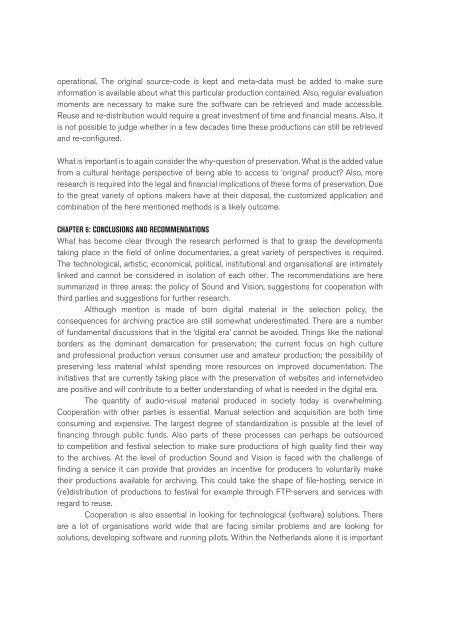Huidige selectiecriteria en de online documentaire HOOFDSTUK 4 ...
Huidige selectiecriteria en de online documentaire HOOFDSTUK 4 ...
Huidige selectiecriteria en de online documentaire HOOFDSTUK 4 ...
You also want an ePaper? Increase the reach of your titles
YUMPU automatically turns print PDFs into web optimized ePapers that Google loves.
operational. The original source-co<strong>de</strong> is kept and meta-data must be ad<strong>de</strong>d to make sure<br />
information is available about what this particular production contained. Also, regular evaluation<br />
mom<strong>en</strong>ts are necessary to make sure the software can be retrieved and ma<strong>de</strong> accessible.<br />
Reuse and re-distribution would require a great investm<strong>en</strong>t of time and financial means. Also, it<br />
is not possible to judge whether in a few <strong>de</strong>ca<strong>de</strong>s time these productions can still be retrieved<br />
and re-configured.<br />
What is important is to again consi<strong>de</strong>r the why-question of preservation. What is the ad<strong>de</strong>d value<br />
from a cultural heritage perspective of being able to access to ‘original’ product? Also, more<br />
research is required into the legal and financial implications of these forms of preservation. Due<br />
to the great variety of options makers have at their disposal, the customized application and<br />
combination of the here m<strong>en</strong>tioned methods is a likely outcome.<br />
CHAPTER 6: CONCLUSIONS AND RECOMMENDATIONS<br />
What has become clear through the research performed is that to grasp the <strong>de</strong>velopm<strong>en</strong>ts<br />
taking place in the field of <strong>online</strong> docum<strong>en</strong>taries, a great variety of perspectives is required.<br />
The technological, artistic, economical, political, institutional and organisational are intimately<br />
linked and cannot be consi<strong>de</strong>red in isolation of each other. The recomm<strong>en</strong>dations are here<br />
summarized in three areas: the policy of Sound and Vision, suggestions for cooperation with<br />
third parties and suggestions for further research.<br />
Although m<strong>en</strong>tion is ma<strong>de</strong> of born digital material in the selection policy, the<br />
consequ<strong>en</strong>ces for archiving practice are still somewhat un<strong>de</strong>restimated. There are a number<br />
of fundam<strong>en</strong>tal discussions that in the ‘digital era’ cannot be avoi<strong>de</strong>d. Things like the national<br />
bor<strong>de</strong>rs as the dominant <strong>de</strong>marcation for preservation; the curr<strong>en</strong>t focus on high culture<br />
and professional production versus consumer use and amateur production; the possibility of<br />
preserving less material whilst sp<strong>en</strong>ding more resources on improved docum<strong>en</strong>tation. The<br />
initiatives that are curr<strong>en</strong>tly taking place with the preservation of websites and internetvi<strong>de</strong>o<br />
are positive and will contribute to a better un<strong>de</strong>rstanding of what is nee<strong>de</strong>d in the digital era.<br />
The quantity of audio-visual material produced in society today is overwhelming.<br />
Cooperation with other parties is ess<strong>en</strong>tial. Manual selection and acquisition are both time<br />
consuming and exp<strong>en</strong>sive. The largest <strong>de</strong>gree of standardization is possible at the level of<br />
financing through public funds. Also parts of these processes can perhaps be outsourced<br />
to competition and festival selection to make sure productions of high quality find their way<br />
to the archives. At the level of production Sound and Vision is faced with the chall<strong>en</strong>ge of<br />
finding a service it can provi<strong>de</strong> that provi<strong>de</strong>s an inc<strong>en</strong>tive for producers to voluntarily make<br />
their productions available for archiving. This could take the shape of file-hosting, service in<br />
(re)distribution of productions to festival for example through FTP-servers and services with<br />
regard to reuse.<br />
Cooperation is also ess<strong>en</strong>tial in looking for technological (software) solutions. There<br />
are a lot of organisations world wi<strong>de</strong> that are facing similar problems and are looking for<br />
solutions, <strong>de</strong>veloping software and running pilots. Within the Netherlands alone it is important


